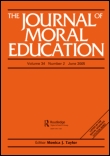
JOURNAL OF MORAL EDUCATION
Scope & Guideline
Fostering Dialogue on Ethics in Education
Introduction
Aims and Scopes
- Moral Development Theories:
The journal consistently engages with various theories of moral development, including virtue ethics and character education, to understand how these frameworks can be applied in educational settings. - Interdisciplinary Approaches:
It emphasizes interdisciplinary research, incorporating insights from sociology, psychology, philosophy, and education to create a more holistic understanding of moral education. - Practical Applications in Education:
The journal focuses on the practical implications of moral education theories, providing educators with strategies and frameworks for implementing moral education in curricula. - Social Justice and Equity:
A significant theme is the exploration of social justice and equity in moral education, addressing how education can contribute to a more just society through the development of moral reasoning. - Character Education:
The journal has a strong focus on character education, examining various models and practices that aim to cultivate virtues and moral behaviors in students.
Trending and Emerging
- Climate Justice and Education:
Recent publications frequently address the intersection of climate change and moral education, emphasizing the importance of teaching students about environmental ethics and social responsibility. - Technology in Moral Education:
There is an increasing focus on the role of technology, such as virtual reality and AI, in shaping moral education, exploring both the opportunities and ethical dilemmas presented by these advancements. - Intergenerational Dialogue and Moral Complexity:
Emerging themes include the importance of intergenerational dialogue in addressing moral complexities, particularly in relation to issues like climate change and social justice. - Empathy and Emotional Intelligence:
Research on empathy, emotional intelligence, and their role in moral education is gaining prominence, reflecting a growing recognition of their importance in fostering moral reasoning and behavior. - Cultural and Contextual Relevance:
There is a trend towards exploring moral education within diverse cultural contexts, recognizing the need for approaches that resonate with specific community values and experiences.
Declining or Waning
- Traditional Moral Philosophy:
There seems to be a waning interest in purely traditional moral philosophy discussions, as the journal shifts towards more empirical and practical applications of moral education. - Universalist Ethical Frameworks:
The focus on universalist ethical frameworks is less prevalent, with more attention now being given to context-specific and culturally relevant approaches to moral education. - Historical Perspectives on Moral Education:
There is a noticeable decline in studies centering on historical perspectives of moral education, as contemporary issues and practices take precedence in recent publications.
Similar Journals

PHILOSOPHICAL STUDIES
Where Philosophy Meets Rigorous ScholarshipPhilosophical Studies, published by Springer, is a prestigious peer-reviewed journal that stands at the forefront of philosophical discourse since its inception in 1950. With ISSN 0031-8116 and E-ISSN 1573-0883, this journal has firmly established itself as a critical platform for disseminating high-quality research in philosophy, positioned in the Q1 category for Philosophy with an impressive Scopus rank of #73 out of 806, placing it in the 90th percentile of its field. Although it does not offer Open Access, the journal’s rigorous selection process ensures that only the most relevant and impactful studies are published, making it an invaluable resource for philosophers, academics, and students alike. With a commitment to advancing philosophical inquiry and fostering a vibrant scholarly community, Philosophical Studies continues to attract contributions that challenge prevailing paradigms and explore new dimensions in philosophical thought. The journal's scope encompasses a wide array of topics within philosophy, encouraging interdisciplinary engagement and dialogue.

Journal of Ethics
Fostering Insightful Dialogue on EthicsJournal of Ethics is a premier academic journal devoted to the exploration and analysis of ethical theories and practices within various disciplines. Published by SPRINGER in the Netherlands, this prestigious journal has established itself within the field of Philosophy, boasting a commendable Q1 classification in the 2023 category quartiles. With an impressive Scopus rank of 145 out of 806 in the Arts and Humanities sector, it occupies the 82nd percentile, indicating its significant impact and reach. The journal aims to provide a platform for rigorous discussion and research that addresses contemporary ethical issues, making it an essential resource for researchers, professionals, and students alike. Although not an Open Access journal, it offers various access options to ensure that critical insights and scholarly contributions are disseminated widely.

Paideusis-The Journal of the Canadian Philosophy of Education Society
Nurturing Scholarly Inquiry in EducationPaideusis - The Journal of the Canadian Philosophy of Education Society serves as a vital platform for scholarly discussion and inquiry within the field of philosophy of education. Published by the Canadian Philosophy of Education Society (CPES) and embracing an Open Access model since 1987, this journal fosters an inclusive environment for researchers, educators, and students seeking to engage with contemporary educational theories and practices. With an emphasis on philosophical reflection and critical analysis, Paideusis invites contributions that challenge and extend our understanding of educational paradigms, making it a crucial resource for those committed to advancing discourse in education. The journal not only aims to promote intellectual engagement but also to cultivate a community where new ideas can flourish, ultimately shaping the future of educational thought and practice.
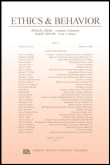
ETHICS & BEHAVIOR
Fostering Innovative Research on Ethical DimensionsETHICS & BEHAVIOR is a leading academic journal published by Routledge Journals, Taylor & Francis Ltd that has been at the forefront of ethical and behavioral research since its inception in 1991. With an ISSN of 1050-8422 and an E-ISSN of 1532-7019, the journal is committed to exploring the complex interactions between morality, ethics, and human behavior in various social contexts. Recognized for its significant contribution to the field, ETHICS & BEHAVIOR holds a notable Q2 ranking in both general psychology and social psychology categories, with impressive Scopus rankings reflecting its academic impact and relevance. Although the journal is not open access, it remains an indispensable resource for researchers, professionals, and students seeking to understand the ethical dimensions of human behavior. Covering diverse topics from applied ethics to behavioral studies, ETHICS & BEHAVIOR serves as a platform for innovative ideas and rigorous empirical research, shaping the discourse in psychology and social sciences. Address: 2-4 Park Square, Milton Park, Abingdon OX14 4RN, Oxon, England.
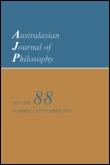
AUSTRALASIAN JOURNAL OF PHILOSOPHY
Connecting Philosophers Across the AustralasiaAustralasian Journal of Philosophy, published by Routledge Journals, Taylor & Francis Ltd, serves as a premier platform for scholarly discourse in the field of Philosophy. With its origins dating back to 1947, this esteemed journal maintains a rich tradition of fostering high-quality, peer-reviewed research and is recognized for its significant contribution to the philosophy community. Holding a distinguished Q1 ranking in the field for 2023 and standing at #75 out of 806 in the Scopus Arts and Humanities ranking, it occupies a vital niche in advancing philosophical knowledge and inquiry. Although the journal is not open access, it periodically offers articles that contribute to the dissemination of philosophical thought, making it a valuable resource for researchers, professionals, and students alike. The AUSTRALASIAN JOURNAL OF PHILOSOPHY continues to inspire and challenge thinkers worldwide as it presents critical analyses, innovative ideas, and rigorous arguments, ensuring its relevance and importance in contemporary philosophical discussions.
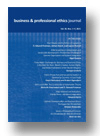
BUSINESS & PROFESSIONAL ETHICS JOURNAL
Elevating Standards through Ethical DiscourseBUSINESS & PROFESSIONAL ETHICS JOURNAL, published by the Philosophy Documentation Center, serves as a premier platform for rigorous research and discourse in the realms of ethics surrounding business practices and professional conduct. Since its inception in 1979, this journal has consistently contributed to the field, encompassing vital discussions that influence ethical standards in business and economics. With a rich historical arch spanning various converged years, it has evolved to become a key resource, currently enjoying a Q4 ranking in Business and International Management and Q4 in Economics and Econometrics in 2023, alongside a strong standing in the philosophy category. While being non-open access, the journal remains an essential reference point for academics and practitioners seeking to navigate the complex ethical landscapes of their fields. As the discourse around business ethics gains importance, the journal positions itself as a critical venue for sharing innovative insights and solutions, making it an invaluable resource for researchers, professionals, and students alike.

JOURNAL OF VALUE INQUIRY
Advancing Discourse at the Intersection of Values and SocietyJOURNAL OF VALUE INQUIRY, published by Springer, is a distinguished academic journal that has been a vital platform for the advancement of philosophical discourse since its inception in 1967. With an ISSN of 0022-5363 and an E-ISSN of 1573-0492, this journal focuses on the intricate intersection of philosophy, law, and social sciences, achieving impressive rankings in various categories with a Q1 designation in Philosophy and noteworthy placements in Law and Social Sciences as of 2023. The journal operates from Dordrecht, Netherlands, and serves as a vital resource for researchers, scholars, and students interested in ethical theories, the foundations of values, and their implications across diverse contexts. Though it is not an open-access journal, it maintains rigorous academic standards, embodying a commitment to contribute to the ongoing discussions in the philosophy of values. With its convergence extending to the horizon of 2024, JOURNAL OF VALUE INQUIRY continues to shape critical thought and foster scholarly dialogue within the realms of humanities and social sciences.

Sophia
Cultivating Knowledge at the Intersection of Thought and TraditionSophia, a prestigious journal published by Springer, is a leading platform for the advancement of knowledge in the fields of Philosophy and Religious Studies. Established in 1962, this open-access journal has embraced a global perspective and invites scholarly contributions that explore complex philosophical questions and the intricacies of religious thought. With an impact factor that reflects its significance, Sophia ranks in the top quartiles of its categories on Scopus, specifically Q2 in Philosophy and Q1 in Religious Studies, showcasing its influence and reach within the academic community. With convenient open access options available since 2009, the journal ensures that research disseminates freely, promoting engagement among researchers, professionals, and students alike. Located in the Netherlands and connected to a reputable international network, Sophia remains committed to fostering intellectual dialogue and enriching the discourse surrounding philosophical and religious issues worldwide.
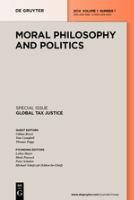
Moral Philosophy and Politics
Unpacking the Complexities of Ethics and SocietyMoral Philosophy and Politics, published by WALTER DE GRUYTER GMBH, stands as a leading journal in the fields of ethical theory, political philosophy, and the social sciences. With an ISSN of 2194-5616 and an e-ISSN of 2194-5624, this journal provides a vital platform for interdisciplinary dialogue surrounding moral issues and political dynamics, particularly emphasizing the integration of historical philosophy with contemporary social issues. As a Q1 journal in both the History and Philosophy of Science and Philosophy categories for 2023, it demonstrates exceptional academic rigor and impact, solidifying its reputation within the academic community. Additionally, it holds significant rankings in Scopus, including #135 in Arts and Humanities (Philosophy) and #45 in Arts and Humanities (History and Philosophy of Science). The journal, which has been converging insights since its establishment in 2014 and will continue through 2024, is crucial for scholars and practitioners alike, enabling them to explore and contribute to the continuing discourse in moral and political thought. While the journal is not open access, it ensures broad dissemination of knowledge through its publication, affirming its importance as a reference point for ongoing research and philosophical inquiry. Located in Berlin, Germany, the journal addresses a global audience eager to engage with pressing ethical and political questions.
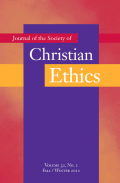
JOURNAL OF THE SOCIETY OF CHRISTIAN ETHICS
Bridging Philosophy and Faith in Ethical ScholarshipJOURNAL OF THE SOCIETY OF CHRISTIAN ETHICS, published by the Society of Christian Ethics, is a prominent peer-reviewed journal dedicated to the scholarly exploration of ethical issues within Christian traditions. With a rich history since its inception in 2002, this journal has established itself as a significant resource for researchers and practitioners in the fields of Philosophy and Religious Studies, reflected in its Q3 quartile rankings and respectable Scopus ratings. Based in the United States, and affiliated with St. John's University, the journal seeks to advance dialogue on complex moral dilemmas encountered in contemporary society through the lens of Christian ethics. Although not an Open Access journal, its compelling contributions and insightful articles are invaluable for students, academics, and professionals aiming to deepen their understanding of ethical discourse. As it converges through the years up until 2024, the Journal of the Society of Christian Ethics remains a vital platform for interdisciplinary engagement and ethical scholarship.